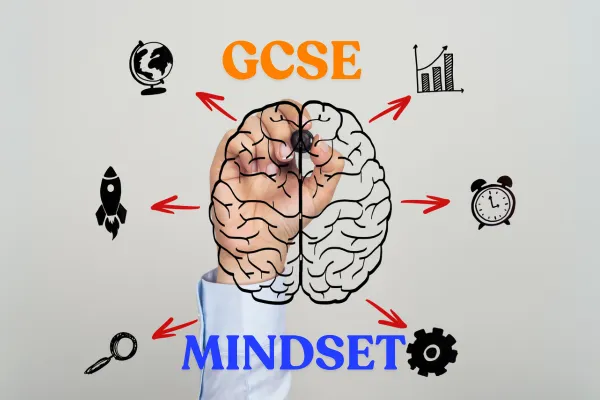The Elizabeth Emerson Exam Academy Blog

B9- The Role of Growth Mindset in GCSE Success – Helping Your Teen Build Resilience
Introduction
GCSE exams aren’t just about intelligence—they’re about resilience, perseverance, and having the right mindset. Some students give up too easily when they struggle, while others push through challenges and improve over time.
What makes the difference? A growth mindset—the belief that abilities can improve with effort—can have a huge impact on motivation, learning, and academic success.
As a parent, you can help your child develop a growth mindset so they approach their GCSEs with confidence and resilience, rather than fear and self-doubt.
Let’s explore how to nurture this mindset and help your teen build the mental toughness needed for GCSE success.
What Is a Growth Mindset?
📌 Growth Mindset: The belief that intelligence and skills can improve through effort and learning.
📌 Fixed Mindset: The belief that abilities are fixed, and if you struggle with something, you’re just “not good at it.”
✅ Example of a Growth Mindset:
✔️ “I don’t understand this topic yet, but if I practice, I’ll improve.”
✔️ “Mistakes help me learn.”
❌ Example of a Fixed Mindset:
✔️ “I’m just bad at Maths. There’s no point in trying.”
✔️ “If I fail, it means I’m not smart.”
✅ Parent Tip: Encourage your child to replace negative thoughts with growth-focused statements.
Why Growth Mindset Matters for GCSEs
Students with a growth mindset:
✔️ Work harder and persist when subjects get difficult.
✔️ See mistakes as learning opportunities rather than failures.
✔️ Are more willing to try new revision techniques instead of giving up.
✔️ Build confidence as they see their progress over time.
Students with a fixed mindset:
❌ Avoid difficult topics because they fear failure.
❌ Give up easily if they don’t get it right immediately.
❌ Feel stressed and anxious about GCSEs.
✅ Parent Tip: If your child often says, “I can’t do this,” add the word “yet” to change their perspective: “You can’t do this… yet.”
How to Help Your Child Develop a Growth Mindset for GCSE Success
1. Praise Effort, Not Just Intelligence
Many students believe that being smart = good grades, but the truth is, effort matters more than natural ability.
✅ Instead of saying:
❌ “You’re so smart at English!”
✅ Say: “I love how much effort you put into analyzing that poem!”
📌 Why? This teaches your child that hard work leads to progress, rather than believing that intelligence is fixed.
✅ Parent Tip: Celebrate small wins—even if they don’t get full marks, praise them for trying, improving, and sticking with it.
2. Reframe Mistakes as Learning Opportunities
Many students fear getting things wrong—but mistakes help the brain grow.
✅ How to Help:
✔️ When they get an answer wrong, ask: “What can we learn from this?”
✔️ Help them see failure as a step toward success, not a sign to quit.
✔️ Remind them that every successful person has failed before improving.
📌 Example:
If your child scores poorly on a Maths mock exam, instead of saying “I’m just bad at Maths,” they should say, “Now I know which topics I need to focus on.”
✅ Parent Tip: Share stories of famous people (e.g., Albert Einstein, Michael Jordan, JK Rowling) who failed before they succeeded.
3. Encourage Smart Revision Strategies
Some students work hard but don’t see results because they use ineffective study methods.
✅ How to Help:
✔️ Encourage active recall instead of passive reading.
✔️ Use past papers to develop exam technique.
✔️ Mix different revision styles to keep learning engaging.
📌 Example: If your child says, “I revised for hours but didn’t improve,” ask: “What revision method did you use? Let’s try something new.”
✅ Parent Tip: Help your child find the best revision techniques for their learning style.
4. Set Small, Achievable Goals
Large goals (“I need a Grade 9 in Science”) can feel overwhelming. Break them into small steps.
✅ How to Help:
✔️ Set mini-goals: “Let’s complete 10 past paper questions today.”
✔️ Use habit tracking: Tick off small study tasks daily.
✔️ Celebrate progress, not just perfection.
📌 Example: If your child struggles with History dates, challenge them to memorize just 5 key events per day instead of the entire timeline at once.
✅ Parent Tip: Focus on progress, not just results—effort leads to improvement.
5. Reduce Exam Anxiety by Changing Their Mindset
Many students feel stressed because they see exams as a test of their intelligence rather than an opportunity to show what they’ve learned.
✅ How to Help:
✔️ Remind them that mistakes are part of learning—it’s okay to get things wrong.
✔️ Encourage deep breathing and relaxation techniques before studying.
✔️ Teach them to say “I can do this” instead of “I’m going to fail.”
📌 Example: Before an exam, instead of saying “I’m terrible at Science,” encourage them to say: “I’ve prepared well, and I’ll do my best.”
✅ Parent Tip: Help them visualize success—imagine walking into the exam confidently and answering questions calmly.
Final Thoughts: Building a Growth Mindset for GCSE Success
Helping your child develop a growth mindset will not only improve their GCSE performance but also help them in life beyond school.
By encouraging effort, embracing mistakes, and focusing on progress, you’ll support your teen in becoming a resilient, confident learner—ready to tackle any challenge.
🌟 My Previous Blog Post: Keeping Your Child Motivated Without Nagging – A Parent’s Guide
🌟 Next Blog Post: How to Reduce Exam Stress – A Parent’s Toolkit
📩 Sign Up for Our Newsletter to receive weekly GCSE revision tips, expert advice, and exam preparation strategies straight to your inbox!
Does your Year 10 or Year 11 child need support with their GCSE exam revision in maths, science or English revision? Contact us at the academy on 07723 177 706 or email [email protected]
